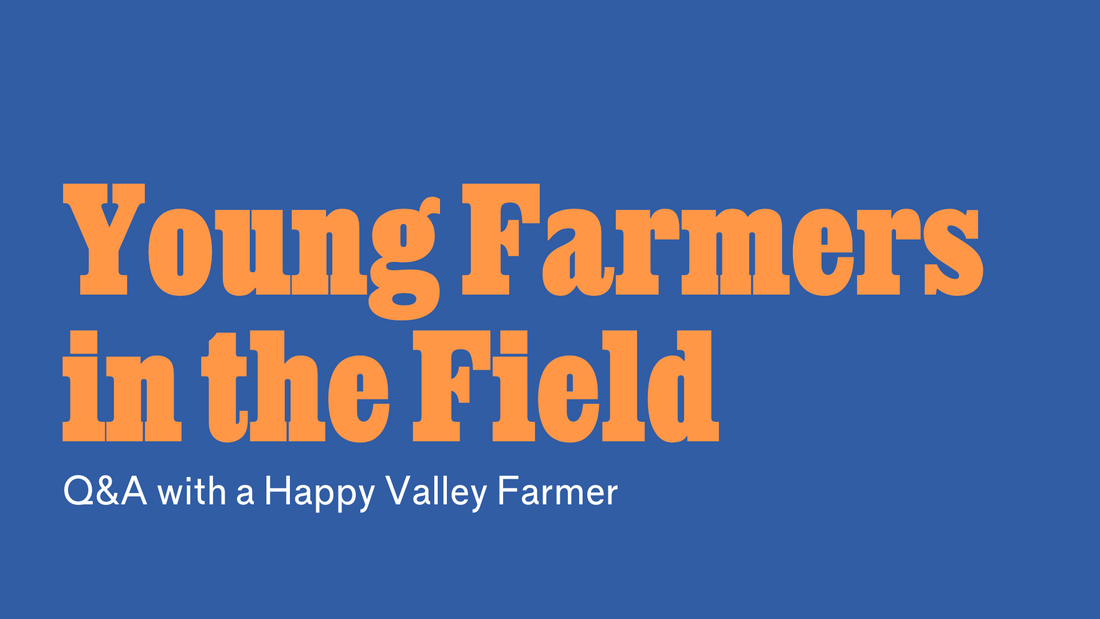Ahoy meaties!
The farming world, like every industry, inevitably changes with every generation that comes through it. We see trends slowly shifting to represent new perspectives, priorities, and technology. For this Hot Beef, we decided to gain insight from the inside. Jesse Rickard is a member of the Happy Valley Meat team and also an independent farmer! Jesse and his wife own Fox Hollow Farm near Mt. Vernon, Ohio. He primarily raises sheep, chicken, pigs, and cattle and has been a part of our team since June of 2022. We sat down with Jesse to discuss the role of millennials in agriculture and to explore his vision for the direction this dynamic group will steer the farming industry in the years to come!
What made you decide to become a farmer, and how did you get started in the profession?
I found my way to farming because I wanted to be involved in hands-on land management. My education was in forestry but when I started my forestry career I realized it would be primarily management and planning. Farming afforded me a chance to be involved in on-the-ground management. I got my start in farming by working on my parents' farm.
What are some of the biggest challenges you face as a millennial farmer, and how do you overcome them?
Definitely land access! My wife and I don't have the financial means to buy a significant amount of farmland so we need to rent it. In addition to renting land we try to maximize our output per acre by raising sheep, chickens, and pigs. We also raise cattle but they have a lower return per acre and if you have limited access to land every acre counts! Most of the other challenges are the ones that any small business owner faces: financial stress, time management, and learning lots of new skills.
How do you think the industry has changed since your parents were farmers?
My parents were first-generation farmers. My take on the biggest changes in farming from their generation to ours is that the price of food has not risen at the same rate as the price of land. That puts pressure on the farmer to figure out how to produce more dollars from fewer acres. I would also say there is more demand and infrastructure for local food than there was 30 years ago so selling into the local market is more viable.
What are some of the misconceptions people have about farming that you would like to correct?
That it is unskilled or does not require an education. I think of it as a minimum wage job that requires a PhD. You just get your PhD in farming through trial and error. The other two things I encounter frequently are either people thinking that it must be such lovely work and others thinking it is way too hard to be enjoyable. I would say both of those are inaccurate in a way. It is an emotionally, financially, and physically difficult profession that is one of the most rewarding and fulfilling things I have ever done.
How do you balance traditional farming practices with the need to be environmentally conscious and sustainable?
The biggest balance for us has been with the cost/availability of inputs. Non-GMO feed is cheaper and more readily accessible than organic. Conventional hay we can buy from a neighbor rather than a big company. Essentially we end up using a mix of conventional inputs and practices with more regenerative ones to balance cost.
How has climate change affected your farm, and how do you adapt to changes in weather patterns?
Dramatic weather swings (hot vs cold and wet vs dry) are the biggest things we’ve had to contend with. That affects the prices for inputs like hay and grain (usually making them go up) because crops are lost or stunted in affected areas. Huge temp swings can be stressful for the animals and warmer, wetter winters are great for parasites and germs. The main problem with all of these things is it creates a lot of unpredictability. The way we deal with that is by planning for robustness in our systems. We also budget emergency funds and try to hold extra resources on hand.
What do you think the future of farming looks like, and what steps are you taking to ensure the success of your farm in the long term?
I envision a future with more small farms but to have those small farms working together in co-ops or unions. Mid-scale distributors and advocates like Happy Valley are an incredible part of a movement in that direction. Small farms have lots of scale challenges that can be helped or overcome with teamwork. On a different note, I think there are about to be a whole lot of robots doing farming work.
What advice would you give to young people who are considering a career in farming?
Get a business degree first. Farming will require a ton of skill and training but if you don’t have a handle on the business part you will go down in flames.

